When developing Android apps, using the right libraries can greatly speed up the process, improve code quality, and add rich functionality to your application. Android Studio, the official Integrated Development Environment (IDE) for Android development, offers a wide array of libraries that cater to various aspects of app development, from UI enhancements to database management and networking. Here’s a look at some of the best Android libraries that can significantly boost your app development experience.
1. Retrofit
The Best Library for Networking and API Integration
Purpose: Networking
Retrofit is one of the most widely used networking libraries for Android development. It simplifies the process of making API requests, handling HTTP connections, and parsing JSON responses. With Retrofit, developers can easily map JSON objects to Java models, making it easier to work with RESTful web services.
2. Glide
The Best Library for Efficient Image Loading and Caching
Purpose: Image Loading
Glide is a popular library for image loading, caching, and displaying in Android apps. It helps manage efficient image processing and prevents memory issues related to large image files.
3. Room
The Best Library for Local Database Management in Android
Purpose: Database Management
Room is a database library that acts as an abstraction layer over SQLite. It simplifies database management by using annotations and data models, allowing developers to manage local storage easily and efficiently. For more on data storage solutions, check our article on Best Practices for Data Management in Android Apps.
4. Dagger Hilt
The Best Library for Simplifying Dependency Injection
Purpose: Dependency Injection
Dagger Hilt is the official Android library for dependency injection. It streamlines the process of injecting dependencies into your app, reducing boilerplate code and improving code structure.
5. Lottie
The Best Library for Stunning Animations in Android Apps
Purpose: Animations
Lottie is a library created by Airbnb for rendering animations created in Adobe After Effects. It allows developers to integrate high-quality, scalable animations into their Android apps effortlessly.
6. Material Components for Android
The Best Library for UI Design and Development
Purpose: UI Design
Material Components for Android is a comprehensive UI library that follows Google’s Material Design guidelines, providing pre-built UI components like buttons, cards, and more for creating beautiful, consistent user interfaces.
7. Firebase
The Best Library for Cloud Services and Real-time Data Management
Purpose: Cloud Services & Real-time Database
Firebase offers a suite of cloud-based tools to help developers build apps faster. Its services include a real-time database, authentication, push notifications, and analytics, making it a versatile tool for any Android app.
8. RxJava
The Best Library for Reactive Programming and Asynchronous Operations
Purpose: Reactive Programming
RxJava brings the power of reactive programming to Android development. It simplifies handling asynchronous tasks and helps improve event-driven programming, especially when working with APIs and databases.
9. Timber
The Best Library for Efficient Logging in Android Applications
Purpose: Logging
Timber is a lightweight logging library that enhances Android’s built-in logging system. It’s simple to use and helps keep your logs clean and manageable, especially in larger projects.
10. Paging Library
The Best Library for Handling Large Data Sets Efficiently
Purpose: Handling Large Data Sets
Paging Library is part of Android Jetpack and makes it easier to load and display large sets of data in chunks, improving memory consumption and app performance.
Using the right libraries in Android Studio can drastically enhance your development experience, whether you’re looking to improve networking, manage databases, enhance user interfaces, or handle background tasks more efficiently. Libraries like Retrofit, Glide, Room, and many others mentioned here simplify the development process and allow you to focus on building great features.
By incorporating these libraries into your Android Studio projects, you can streamline app development and ensure your apps are robust, scalable, and feature-rich, providing the best experience for your users.








